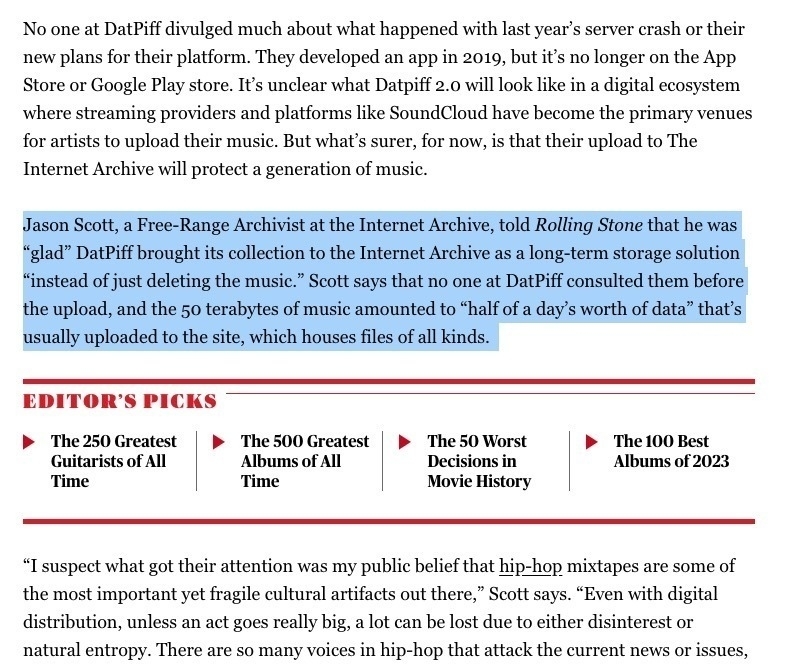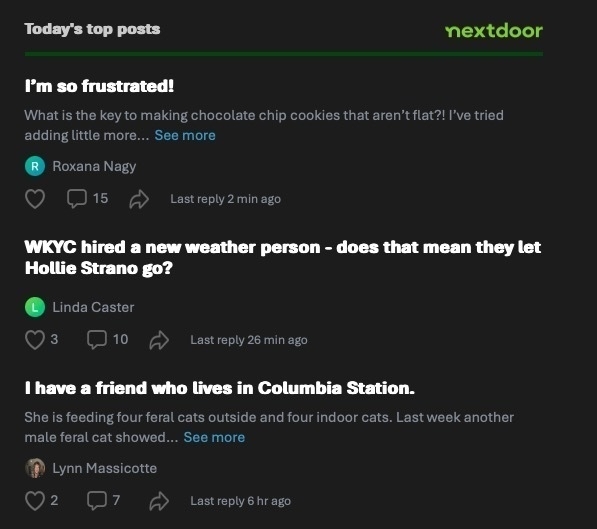Libraries are the last video store
Not that we need another example of why libraries rule, but I recently realized it’s the last place I can go to ge...SBOMs for AI Models
Talking a lot on the CISO Series about software bill of materials, or SBOMs, as a way to get more visibility into the so...Where Did CNET's Search Go?
CNET was one of the foundational sites for me in my early interneting. It had high-volume and high-quality articles acro...Glad to see Samsung guaranteeing seven years of OS updates on it’s latest Galaxy flagship phones. It’s still at a slight disadvantage to Pixel and iPhones in that these OS updates won’t be day of release (I think). But it means the biggest Android OEM is taking away one of Apple’s biggest advantages. Now let’s bring these kind of updates to their more affordable phones.
HIPB Finds Fresh Emails
Troy Hunt just added a new data breach to Have I Been Pwned that includes 33% unique email addresses, ones that haven&rs...Yamaha Remembers the QY-Series Glory
Yamaha just announced an interesting little groovebox, the SEQTRAK. It’s billed as an OP-Z competitor, and I get i...The Internet Archive is always kind of amazing. Just a 50TB free upload with no notice and everyone can access it.

Thank you health insurance. The cost of a visit is either a bargain or on average.

On the one hand, the external eye thing is still deeply unsettling as presented in all Apple marketing. On the other hand, maybe it’s like mixed reality litmus test. If you’re on board for that, you’re down for anything.

Recently I switched from TinyLetter (RIP) to WordPress Newsletters. Only regret so far is that I lost my published back catalog of newsletters. But just for media handling alone I’m glad I made the switch. TinyLetter couldn’t do things like rotate an image in the app. Turns out WordPress is good :)
I really though Apple would announce plans to offer in-store demos ahead of the launch to further build hype. I’m sure in-store experiences will be a big part of the launch plans, but was hoping to get a look a little earlier.
Every once in a while, I’m tempted to log into my Nextdoor account.

Microsoft deprecates Mixed Reality
It’s kind of crazy that given the VR boom Meta saw in the pandemic that Microsoft couldn’t make any play wit...Stacking the AI Turtles
A lot of times when dealing with complicated systems, it’s easy to get to a “turtles all the way down”...Hacking with Mr. Cooper
Just 14 million people with social security numbers and banking information exposed. It’s crazy how numb we are to...So I was recently on DTNS talking about migrating away from TinyLetter.
One thing I forgot to mention, I found a way to export the content of newsletters! TinyLetter lets you easily export your subscriber lists, but otherwise you can only export the record of each newsletter being sent (time, date, title), but not content. Turns out you’re a wget command away. Tried it and it worked beautifully to back up over five years of newsletters.
TL;DR on the migration, ended up going with WordPress.
Patreon showing some middle child energy here
My small (ha) issue with Micro Blog: I want my posts on my site to have titles, but if I add one, it only posts the title and the link to social feeds. I find it a lot more engaging to share the first part of the post. I guess I could just edit to add a title after, but that’s kludgy.
The Yak Bak Is the Exception to 90s Nostalgia
We’ve reached the point of 90s nostalgia that I’m shocked when there’s something from the era has esca...Amazon re-released a Fire TV Cube as an AWS thin client. It costs $199, while you can pick up a Fire TV Cube for $109. While I’m sure there’s some cost of developing a new software stack for enterprises, this says much more to me about how the consuming-facing platform is subsidized by ads.
Replying to a text with a voice memo is a profound breach of the social contract
Teenage engineering has justifiably gotten flack for creating designer audio gear that is ridiculously expensive for what it does. Their recent Field series saw them a long way from the entry level price point of Pocket Operators. Glad to see them making something much more approachable with their new EP-133.
One, it looks awesome, like a Famicom meets a Speak and Spell. But more importantly, for a $300 sampler, it seems to check a lot of boxes. Stereo sampling, lots of effects (including for external sources), velocity sensitive pads, deep sequencer, not completely crippled I/O, there’s a lot to love!
Now it’s Teenage Engineering, so there will assuredly be a weird UI, frustrating limitations (64MB of sample memory to start), and likely quality control issues. But it’s way cheaper than the SP-404, which is I’m guessing its main competition. Nice to see them making functional things that I can actually afford (that isn’t a weird wooden chorus).
The Verge published a nice piece talking with TE co-founder David Eriksson with some more thoughts on how they designed it. Hopefully we’ll see some other Pocket Operators “upgraded” to the EP lineup. Would love to see a dedicated drum machine with this form factor.

I though this would seen Altman start a new venture and then Microsoft eventually acquire it. But they must have given him a Scrooge McDuck vault of money to hire him directly
My son got this from the school library and I hope he gets the series

I am evidently a podcast hoarder
